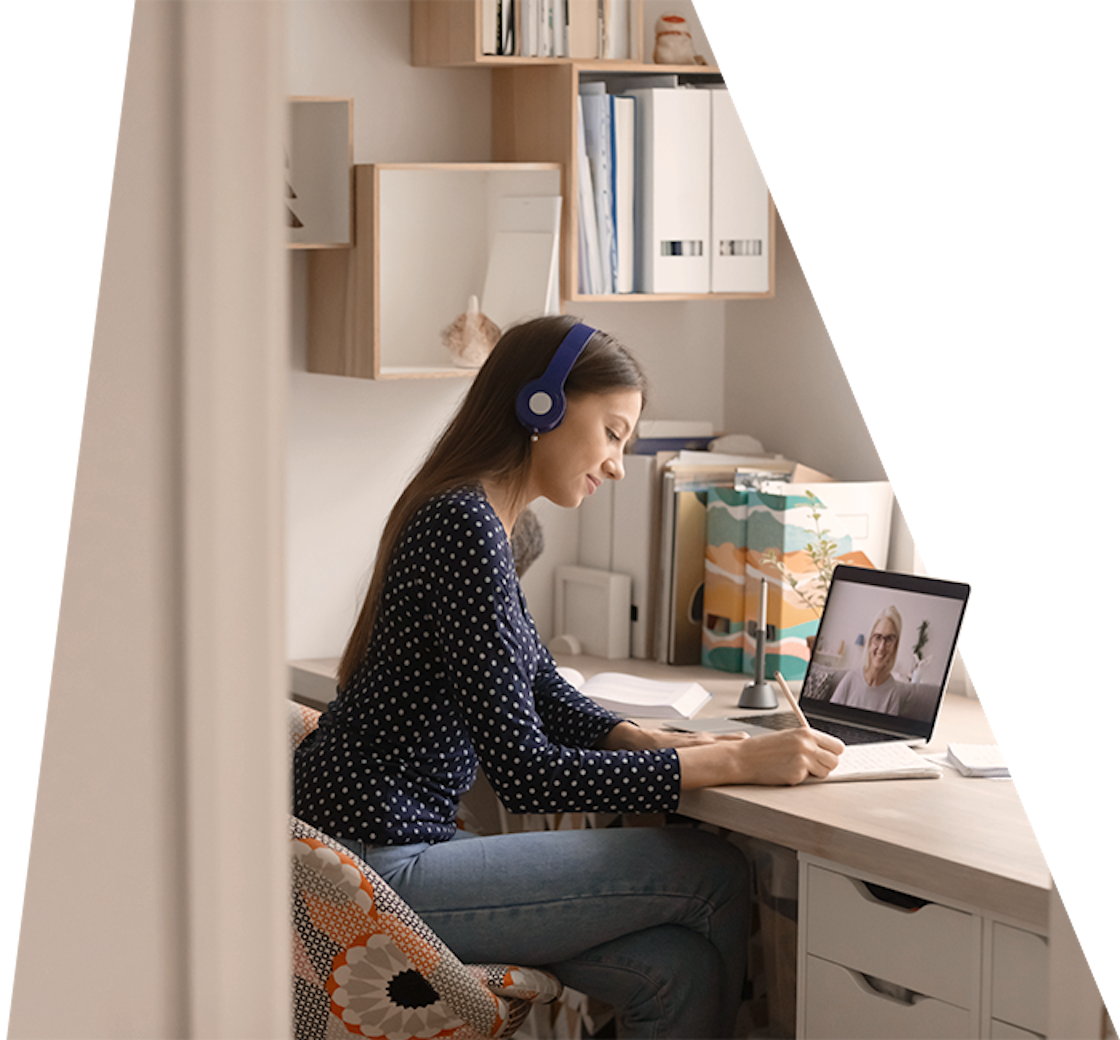
How to start working from home to set yourself up for success
Thinking about working from home? It sounds like a dream—no commute, no office politics, total flexibility. But without the right habits, it can quickly turn into a challenge. Discover how to stay productive, avoid common pitfalls, and make remote work a long-term success!

Working from home can seem like the obvious and ideal choice when you become self-employed. Especially if you’re starting out and want to keep your costs low. And there certainly are benefits to ditching the commute, escaping office politics, and being able to work more flexibly. But it can also be challenging, as many more people have found over recent years.
Developing good habits and practices from the start will help you become more productive and successful when you’re working from home. They will also help you minimise potential issues in the future. I’ve mainly worked from a home office for 15 years. And speaking with other freelancers and business owners, there are many core issues we all experience, even if our solutions may vary.
Choose the right workspace
You might assume that having a dedicated space to work from home requires a full office setup, but that’s not necessarily the case. While some of us might prefer a desk packed with computer monitors and a big ergonomic office chair, other people may choose a small laptop and a comfy sofa, or working amongst their family at the kitchen table.
The right workspace is a personal preference, but having somewhere designated for work does allow separation between your career and leisure time. And it helps your mind to focus when you need to get things done.
Investing even a small amount to make your workspace more pleasant and comfortable is usually worthwhile, as you’ll be more productive and minimise the risk of aches and pains in the future.
Set expectations with people in your home
Establishing some clear ground rules with family or housemates will make things run more smoothly. If your partner goes out to work, they may assume you’ll have time to take care of the house because you’re at home all day. Alternatively, if you’re all working from home, or there are children around, it can be difficult to find quiet times for meetings or concentrating on focused work.
Just having some quick conversations with the rest of your household can establish some boundaries, and means they’ll know if you prefer company or solitude at various times of the day. Or whether it’s safe to barge into a room without disrupting a big client meeting.

Flexible routines and boundaries will help
Becoming self-employed allows you complete freedom and control over your career. But without any structure to your day, it’s easy to become distracted by household tasks or hobbies. Alternatively, you might find you’re so involved with work that you skip meals, exercise, and family time.
A rough schedule and a morning routine will help you to maintain a healthy balance between your work and personal life, and help your brain switch into professional mode. And while you might enjoy working later when you’re focused on completing a task, or client work requires it, having a normal time to ‘clock off’ will help you to wind down, rest and get a good night of sleep. That will help you to manage stress and prevent burnout over the long-term.
Don’t skip regular breaks and exercise
It can be easy to spend every waking minute either working on your business or thinking about it, especially when you’re starting out. That initial motivation can help you achieve a lot, but without regular breaks and exercise, it won’t be sustainable.
Sitting and working all day can cause various health issues, especially if you’re constantly staring at a computer screen or your phone. Taking short breaks to get up and move around will help to keep your mind and body more productive when you’re working. If it’s possible, getting outside for some natural light and fresh air will also give you a change of scenery, and research shows being in nature helps creativity.

Schedule regular social activities
If you’re freelancing or running a business by yourself, it’s easy to prioritise it above spending time with family and friends, or meeting new people. While it’s fine to postpone a night at the pub to meet a client deadline when necessary, ignoring your social life entirely will actually damage your career in the long-term.
Even introverts or those with social anxiety will benefit from meeting with other self-employed people to share experiences and learning, catching up with friends and family, or taking time for a social hobby or interest. Even if you prefer to spend the majority of your time working alone in your home office, being connected loosely to more people will mean a greater number of opportunities are likely to come your way.
Just as being self-employed requires you to be more proactive with your work, it also means you need to put a little more effort into making sure you’re socialising on a regular basis and meeting new people. But it’s also a lot more fun when you’re choosing to hang out with people you want to be with, rather than having to force a conversation with colleagues in the office at 9am every morning.
Look after your equipment and software
Whatever equipment you use to work from home is now essential to maintaining your income, and you don’t have the support of a company IT department or insurance. It’s down to you to make sure that you are covered in the event of hardware failure, a failed software update, breakage, or theft.
IPSE members can benefit from discounted business insurance, breakdown cover and more. But you should also schedule regular times to clean and update your computer, back up important data, and keep key software updated. Viruses and malware can cause expensive problems, especially if client data is compromised or stolen.
Power cuts, broadband outages, and other self-employed emergencies will happen to everyone from time-to-time. A little planning and preparation will mean they’re a minor inconvenience rather than a major disaster.

Understand your eligible expenses
Working from home means you’re able to claim a proportion of your household costs, based on how much is used for your business. That can include your heating, power, internet access, and phone bills, along with council tax, mortgage costs or rent.
You can also claim for software and office supplies. For anything which has a shared use, you’ll need to calculate a percentage cost to claim (for example, if you use one room entirely as an office), and for purchases you’ll need to keep records and receipts for anything you wish to claim.
An alternate option is to claim a flat rate as a limited company director or sole trader (with the rate changing depending on the hours you work from home each month).
Whichever option you choose, it’s important to know which expenses you can claim working from home.
Stay on top of communication
You know that you’ve spent all week working 12-hour days to ensure your client project is delivered on time. But does your client? If you’re focused on the task in hand, it’s easy to let communication slip, especially if you’re not using any shared time-tracking or project management tools.
It’s easy to become overloaded with email, Slack channels, video meetings and phone calls. But being proactive in updating clients will build trust, allowing them to relax and know their money is being well-spent on you. It also means they’re less likely to be chasing you in a panic at odd hours of the day or night.
You can also set expectations by stating that you typically respond to emails within 24 or 48 hours (for example), and putting that in your email signature.
Some face time can be hugely helpful
Even if you prefer to work remotely from clients as much as possible, it can be worth scheduling some in-person meetings or events occasionally. Especially when you’re building a new relationship with a client, it can help establish trust and respect more quickly than video calls. And spending time at a client location can spark new questions, insights, and ideas.
If you’re travelling to a client for a scheduled meeting, you can build in some time to work from a spare desk for a few hours. Or plan it around a conference, training, team-building, or office party to help you get to know both your direct contacts and managers, but also other staff.

Develop new skills through continual learning and training
Being self-employed and working from home means you’re responsible for your career development. And while you’ll naturally build experience over time, continual learning and training will often be quicker and more cost-effective, as well as providing qualifications that clients can recognise.
If you’re just starting out in self-employment, the IPSE Incubator is designed to guide you through launching a business in 30 days. More experienced IPSE members can also benefit from a range of dedicated webinars and guides for freelancers, contractors and business owners to support your career.
Learning new skills and techniques can reinvigorate your passion for your profession, help you get more from the software and services you’re paying for, and help you find new clients, or justify raising your rates.
Take time off and sick days
Almost a quarter of UK freelancers took five days or less off in a year, despite IPSE research showing the positive impacts that it has on work, mental health and personal relationships. And despite the fact that many people choose self-employment to be more flexible with their time.
It’s understandable that taking a holiday or short break from work can seem like lost income, but it can boost your productivity, creativity, and energy, as well as reducing stress. By planning your budget and client workload in advance, you can take time away without worrying.
Working through illness and injuries can also seem like a necessity when you’re self-employed, but that doesn’t have to be the case. IPSE members are covered if you can’t work for three or more weeks, and most clients will be understanding about short illnesses if you keep them informed as soon as possible.
A significant number of people choose freelancing and self-employment because they’re better able to manage a disability or chronic health condition. Conversations with clients, support from the IPSE community and acknowledging your need for self-care will help you to maintain a successful career.
Don’t forget your new client pipeline
If you’re working from home with a good number of clients, it’s easy to become settled and comfortable. Which can become a problem if one or more of your projects comes to an end, and you haven’t already lined up new work.
Even when you’re fully booked, it’s important to still generate new leads which you can either schedule further in the future, pass on to other freelancers, or use to build a larger business with sub-contractors or full-time employees.
Give yourself, and your clients, some leeway
If you’re mainly interacting online, it can be easy to misread the tone of emails or comments on projects. Or you may not be aware that your client is dealing with a different work or personal problem at the same time. It’s easy to assume that a short and curt message is a personal attack on your or your work, but that’s often not the case.
When you’re emailing, messaging or in a video conference, it’s best to be as positive as possible to ensure that it comes across to the recipients and attendees. If you’re appearing via a screen you need to ramp things up a bit more than normal, which is why you can always tell when TV presenters or Youtubers are in work mode, because they suddenly ramp their personality up by 50 per cent or more.
And extend the same kindness to yourself. No-one is totally productive every second of the working day, and sometimes you’ll be distracted by life, make mistakes, or take a little too long for your lunch break. If there are things you can do to help yourself in the future, put them in place, but also be forgiving to yourself. Especially as working from home means there’s less chance of colleagues lifting you out of a negative mood. Having a positive music playlist, some motivational videos or reading saved somewhere convenient can be really useful for reframing things in a better way.

How IPSE can help you work from home successfully
We’ve got a huge range of guides, videos and more to help you start working from home and set yourself up for success, from desk exercises you can do at home, to budgeting and saving money when you work remotely. Other ways IPSE will support you include:
- The IPSE Incubator for those starting out in self-employment
- Illness and injury cover
- Unlimited co-working when you want to get out of the home office
- Events and the IPSE Community to meet new people both online and offline.
Offers and discounts on a wide range of products and services for the self-employed, including insurance, breakdown cover and financial advice.

